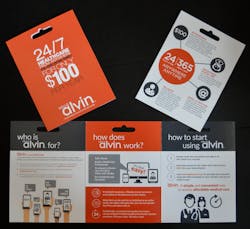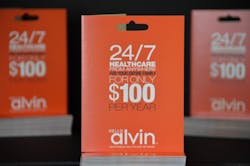Hello Alvin: A new telehealth network designed for truckers
As an over-the-road truck driver, what happens when you get a sore throat or think you have a sinus infection? Do you stop to find the nearest clinic, or just ignore the symptoms and keep going to make your delivery?
What if you could use your mobile device’s camera to zoom in to whatever the problem area is and send a picture to a doctor on call who could potentially prescribe an antibiotic at the nearest pharmacy to you? That’s what a new healthcare network hopes to provide for long-haul drivers.
Relatively new to the industry and designed for the trucker lifestyle, Hello Alvin touts itself as the nation’s first mobile healthcare network and offers 24/7 access to healthcare via any mobile device – phone, tablet or computer.
According to CEO and co-founder Joey Truscelli, when professional drivers experience non-emergency illnesses – flu, migraines, respiratory illnesses, allergies or even urinary tract infections – and need immediate access to healthcare, they can leverage the network’s telehealth piece that allows them to speak with a doctor or registered nurse 24/7.
Truscelli, who previously handled transactions with doctor’s offices and insurance companies for 16 years, told American Trucker that throughout his career, he started working with families and met a lot of professional truck drivers along the way.
“Driving a truck is one of the toughest jobs out there right now,” he said, noting that many of the drivers he’s spoken don’t have health insurance. “We thought, ‘Let’s set up a nationwide center and use some of the travel stops where professional drivers can come in and purchase healthcare access.’”
“A lot of people are afraid to go to the doctor,” he added. “But it’s amazing how many people will talk to a doctor on the phone or feel comfortable live chatting with them. We provide a little bit of continuity and comfort that they can rely on service from, say, a Love’s Travel Center.”
Truscelli said Hello Alvin just started distribution at travel stops and truck centers 60 days ago. He added the network currently has 4,000 doctors nationwide and 30% of those doctors are bilingual. Users can expect about an 8-10 minute callback time from doctors, he added.
The cost to speak with a live doctor is $45, and the $100 annual fee (which covers an entire family) includes emailing doctors and talking to nurses. Users can also be prescribed antibiotics and other non-narcotic prescriptions as needed, Truscelli noted. Hello Alvin expects to launch a mental health and wellness program within its network this fall.“There’s a lot of passion behind this project,” Truscelli stressed. “We feel there are a lot of people who understand how valuable these drivers are to our country. Without them we wouldn’t have the products we need or anything. We want to help these guys have a longer much healthier life.”
Health problems are one of the top reasons the industry loses good, qualified drivers. And according to a recent report by the American Trucking Associations (ATA) that stated turnover is at “historically low levels,” it’s still ticking up, and it’s something the industry is keeping an eye on.
The stresses associated with work as a truck driver—including irregular schedules and economic pressures—place drivers at substantial risk for insufficient sleep, and that in turn leads to the chronic health issues pervasive in the industry, including sleep apnea, hypertension, cardiovascular disease, adult-onset diabetes, and other conditions commonly associated with obesity.
When it comes to vetting healthcare professionals, Truscelli explained the company worked with its partner Teladoc to provide more than 3,600 board-certified doctors, pediatricians, dermatologists and therapists. He added that mid-size to larger carriers can also incorporate Hello Alvin as a supplemental option to healthcare for their drivers on the road.
“I think this is a movement,” he said. “We’re here to help professional drivers become healthier.”
About the Author

Cristina Commendatore
Cristina Commendatore is a past FleetOwner editor-in-chief. She wrote for the publication from 2015 to 2023.


